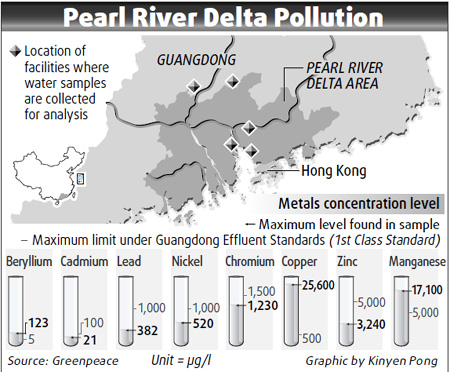Pearl River polluted by discharges
 |
The Pearl River, China's third longest river, is being poisoned by industrial discharges due to inadequate water pollution regulation, according to a Greenpeace report released yesterday.
The international environment protection group collected and analyzed 25 samples of wastewater discharges and sediments from five industrial sites located in Guangdong province since February, and found that a diverse range of hazardous chemicals are being released into the Pearl River.
The samples included high levels of heavy metals such as beryllium, copper and manganese, which have been linked to brain damage, said Edward Chan, campaign manager of Greenpeace China.
"Products made in the region that are exported worldwide are being manufactured at a high cost to the environment of the Pearl River," Chan said.
The Pearl River Delta, widely known as the "world's factory floor," is home to nearly 30 percent of China's exports. About 70,000 factories in the region are owned by companies in the neighboring city of Hong Kong.
Four of the five industrial sites found with excessive chemical discharges are owned by Hong Kong companies.
Samples from one of the sites contained beryllium, which is linked to lung damage. The samples had 25 times the level allowed by local environmental protection regulation, the research report said.
China revised its law to tackle water pollution last year and issued China's Cleaner Production Promotion Law in 2002.
"A number of hazardous substances are not yet regulated in China," Chan said. "More needs to be done to specify clearly all hazardous substances from industrial discharge."
Zeng Yongping, a researcher with the Chinese Academy of Sciences, said that once these hazardous substances are released into the environment, "it's almost impossible to remove them."
Since last year, Guangdong has implemented an industrial transfer plan to move factories in the Pearl River Delta region to its remote northern, eastern and western mountainous areas.
"In this transfer plan, local government authorities should implement stricter environment regulation to avoid further water pollution in the Pearl River," Zeng said.
 0
0 






